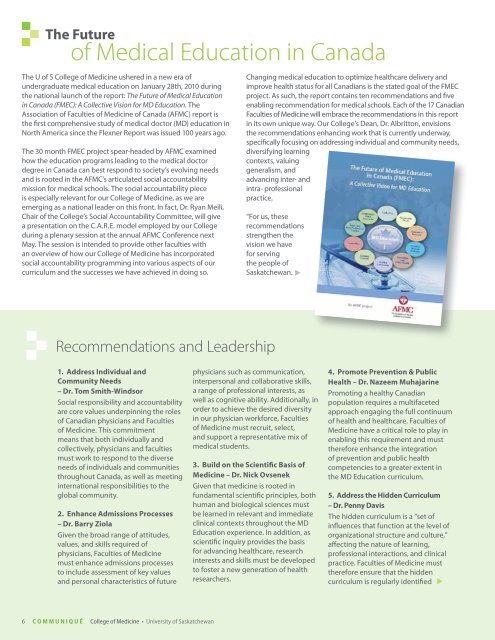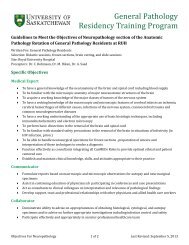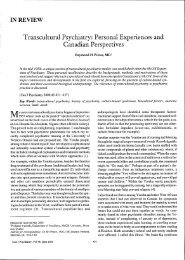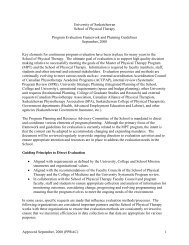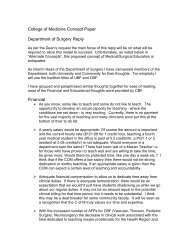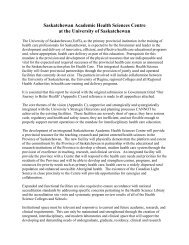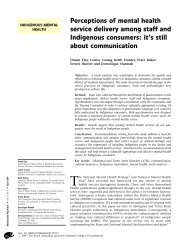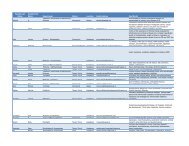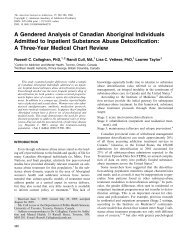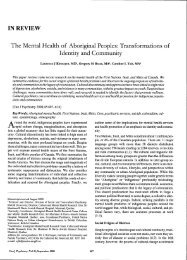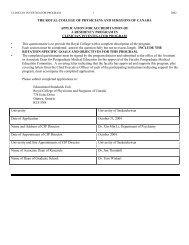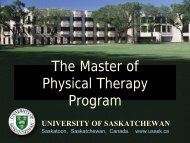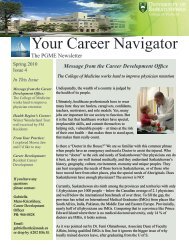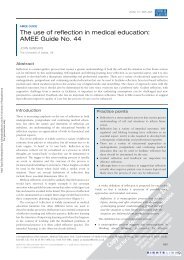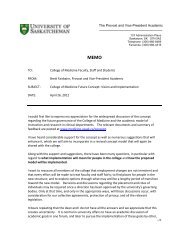COMMUNIQUé - College of Medicine - University of Saskatchewan
COMMUNIQUé - College of Medicine - University of Saskatchewan
COMMUNIQUé - College of Medicine - University of Saskatchewan
You also want an ePaper? Increase the reach of your titles
YUMPU automatically turns print PDFs into web optimized ePapers that Google loves.
The Future<br />
<strong>of</strong> Medical Education in Canada<br />
The U <strong>of</strong> S <strong>College</strong> <strong>of</strong> <strong>Medicine</strong> ushered in a new era <strong>of</strong><br />
undergraduate medical education on January 28th, 2010 during<br />
the national launch <strong>of</strong> the report: The Future <strong>of</strong> Medical Education<br />
in Canada (FMEC): A Collective Vision for MD Education. The<br />
Association <strong>of</strong> Faculties <strong>of</strong> <strong>Medicine</strong> <strong>of</strong> Canada (AFMC) report is<br />
the first comprehensive study <strong>of</strong> medical doctor (MD) education in<br />
North America since the Flexner Report was issued 100 years ago.<br />
The 30 month FMEC project spear-headed by AFMC examined<br />
how the education programs leading to the medical doctor<br />
degree in Canada can best respond to society’s evolving needs<br />
and is rooted in the AFMC’s articulated social accountability<br />
mission for medical schools. The social accountability piece<br />
is especially relevant for our <strong>College</strong> <strong>of</strong> <strong>Medicine</strong>, as we are<br />
emerging as a national leader on this front. In fact, Dr. Ryan Meili,<br />
Chair <strong>of</strong> the <strong>College</strong>’s Social Accountability Committee, will give<br />
a presentation on the C.A.R.E. model employed by our <strong>College</strong><br />
during a plenary session at the annual AFMC Conference next<br />
May. The session is intended to provide other faculties with<br />
an overview <strong>of</strong> how our <strong>College</strong> <strong>of</strong> <strong>Medicine</strong> has incorporated<br />
social accountability programming into various aspects <strong>of</strong> our<br />
curriculum and the successes we have achieved in doing so.<br />
Changing medical education to optimize healthcare delivery and<br />
improve health status for all Canadians is the stated goal <strong>of</strong> the FMEC<br />
project. As such, the report contains ten recommendations and five<br />
enabling recommendation for medical schools. Each <strong>of</strong> the 17 Canadian<br />
Faculties <strong>of</strong> <strong>Medicine</strong> will embrace the recommendations in this report<br />
in its own unique way. Our <strong>College</strong>’s Dean, Dr. Albritton, envisions<br />
the recommendations enhancing work that is currently underway,<br />
specifically focusing on addressing individual and community needs,<br />
diversifying learning<br />
contexts, valuing<br />
generalism, and<br />
advancing inter- and<br />
intra- pr<strong>of</strong>essional<br />
practice.<br />
“For us, these<br />
recommendations<br />
strengthen the<br />
vision we have<br />
for serving<br />
the people <strong>of</strong><br />
<strong>Saskatchewan</strong>.<br />
s<br />
Recommendations and Leadership<br />
1. Address Individual and<br />
Community Needs<br />
– Dr. Tom Smith-Windsor<br />
Social responsibility and accountability<br />
are core values underpinning the roles<br />
<strong>of</strong> Canadian physicians and Faculties<br />
<strong>of</strong> <strong>Medicine</strong>. This commitment<br />
means that both individually and<br />
collectively, physicians and faculties<br />
must work to respond to the diverse<br />
needs <strong>of</strong> individuals and communities<br />
throughout Canada, as well as meeting<br />
international responsibilities to the<br />
global community.<br />
2. Enhance Admissions Processes<br />
– Dr. Barry Ziola<br />
Given the broad range <strong>of</strong> attitudes,<br />
values, and skills required <strong>of</strong><br />
physicians, Faculties <strong>of</strong> <strong>Medicine</strong><br />
must enhance admissions processes<br />
to include assessment <strong>of</strong> key values<br />
and personal characteristics <strong>of</strong> future<br />
physicians such as communication,<br />
interpersonal and collaborative skills,<br />
a range <strong>of</strong> pr<strong>of</strong>essional interests, as<br />
well as cognitive ability. Additionally, in<br />
order to achieve the desired diversity<br />
in our physician workforce, Faculties<br />
<strong>of</strong> <strong>Medicine</strong> must recruit, select,<br />
and support a representative mix <strong>of</strong><br />
medical students.<br />
3. Build on the Scientific Basis <strong>of</strong><br />
<strong>Medicine</strong> – Dr. Nick Ovsenek<br />
Given that medicine is rooted in<br />
fundamental scientific principles, both<br />
human and biological sciences must<br />
be learned in relevant and immediate<br />
clinical contexts throughout the MD<br />
Education experience. In addition, as<br />
scientific inquiry provides the basis<br />
for advancing healthcare, research<br />
interests and skills must be developed<br />
to foster a new generation <strong>of</strong> health<br />
researchers.<br />
4. Promote Prevention & Public<br />
Health – Dr. Nazeem Muhajarine<br />
Promoting a healthy Canadian<br />
population requires a multifaceted<br />
approach engaging the full continuum<br />
<strong>of</strong> health and healthcare. Faculties <strong>of</strong><br />
<strong>Medicine</strong> have a critical role to play in<br />
enabling this requirement and must<br />
therefore enhance the integration<br />
<strong>of</strong> prevention and public health<br />
competencies to a greater extent in<br />
the MD Education curriculum.<br />
5. Address the Hidden Curriculum<br />
– Dr. Penny Davis<br />
The hidden curriculum is a “set <strong>of</strong><br />
influences that function at the level <strong>of</strong><br />
organizational structure and culture,”<br />
affecting the nature <strong>of</strong> learning,<br />
pr<strong>of</strong>essional interactions, and clinical<br />
practice. Faculties <strong>of</strong> <strong>Medicine</strong> must<br />
therefore ensure that the hidden<br />
curriculum is regularly identified<br />
s<br />
6 C O M M U N I Q U É <strong>College</strong> <strong>of</strong> <strong>Medicine</strong> • <strong>University</strong> <strong>of</strong> <strong>Saskatchewan</strong>


